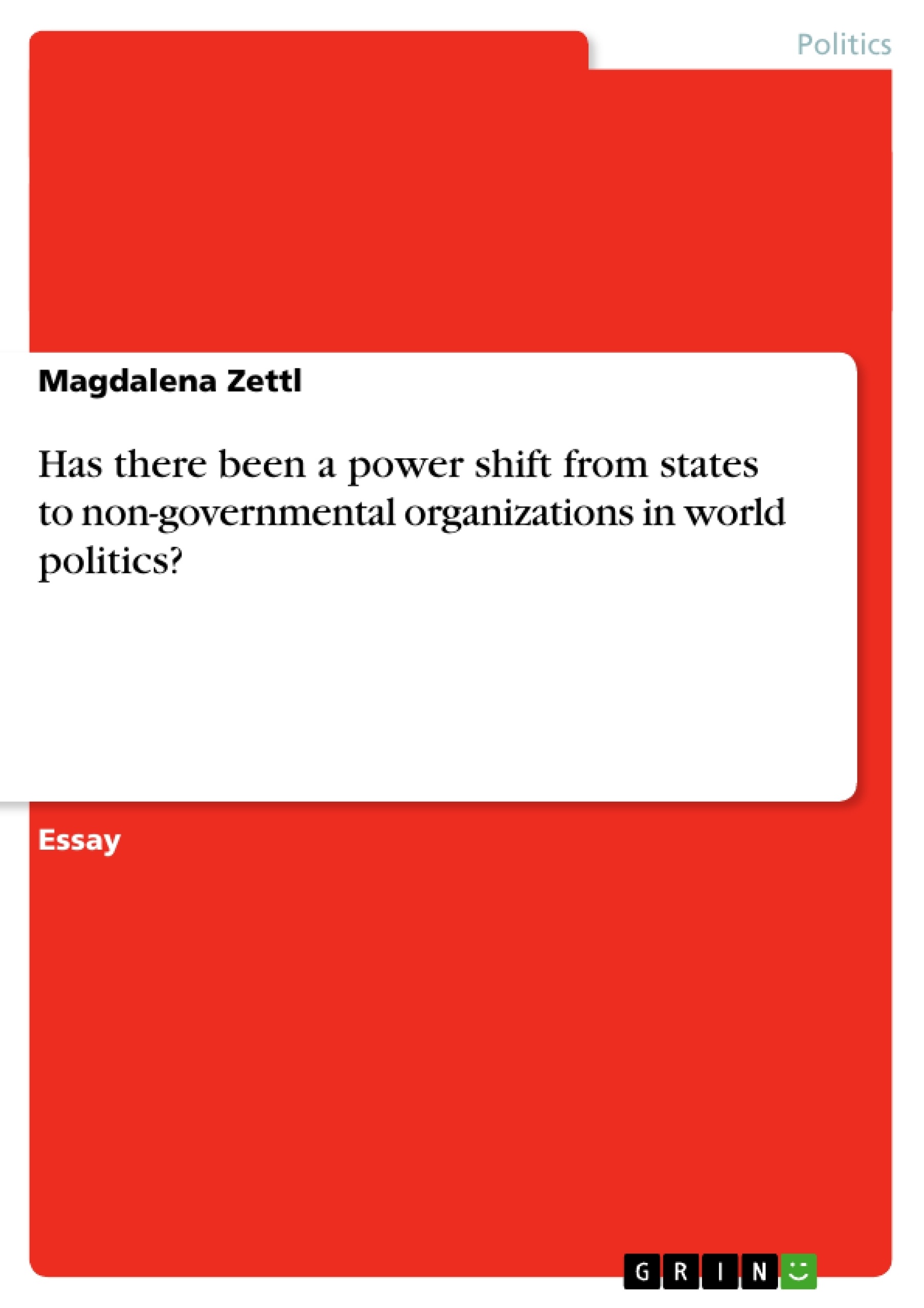The essay analyzes if there has been a power shift from states to non-governmental organizations in world politics and critically analyzes the following two standpoints: some scholars (Lipschutz, 1992; Mathews, 1997; Keck & Sikkink, 1998; Rosenau, 2002) see the emergence of NGOs from a bottom-up perspective and argue that the decline in state power is a causal consequence of the increasing emergence of non-state actors in a zero-sum-relationship. Others (Reimann 2006, Sending & Neumann, 2006) view NGO growth as a top-down process and assert that states encourage NGO development and that non-state actors and nation-states merge into one network not sharing a limited amount of power but expanding on power.
Inhaltsverzeichnis (Table of Contents)
- Introduction
- Defining Power and NGOs
- NGOs: Powerful Players in World Politics
- Theories on NGO Growth: Top-Down vs. Bottom-Up Perspectives
- A Symbiotic Relationship: States and NGOs in Cooperation
- Conclusion: Toward a More Efficient Cooperation between States and NGOs
Zielsetzung und Themenschwerpunkte (Objectives and Key Themes)
This essay examines the relationship between states and non-governmental organizations (NGOs) in world politics, specifically addressing the claim that NGOs have gained power at the expense of state power. The essay argues for a collaborative and complementary relationship between these actors, rejecting a zero-sum power game. The key themes explored in this essay include:- The changing nature of power in the international system
- The emergence and influence of NGOs in world politics
- The relationship between state power and NGO growth
- The role of globalization and international organizations in shaping the power landscape
- The potential for cooperation and collaboration between states and NGOs
Zusammenfassung der Kapitel (Chapter Summaries)
- The introductory chapter discusses the traditional realist view of states as the primary actors in the international system and examines the challenges to this view in the post-Cold War era. It highlights the emergence of NGOs as influential players in world politics.
- Chapter two defines the concept of power and provides a nuanced understanding of NGOs, exploring their characteristics and role in global governance.
- Chapter three explores the rise of NGOs from the 1970s onwards, highlighting the impact of UN Article 71 and the increasing inclusion of NGOs in international conferences. It also examines the development of a "pro-NGO norm" in the 1980s and 1990s.
- Chapter four analyzes the theories regarding the growth of NGOs, contrasting the bottom-up perspective of scholars like Mathews with the top-down perspective of Reimann and Sending & Neumann. It introduces the concept of governmentality as a framework for understanding power relations.
- Chapter five argues against a zero-sum relationship between states and NGOs, proposing a cooperative and complementary model. It demonstrates how NGOs can work alongside states, providing expertise and mobilizing civil society groups, while states remain the principal actors in world politics.
Schlüsselwörter (Keywords)
This essay examines the complex interplay between states and NGOs in global governance, analyzing concepts of power, international relations, and the changing role of non-state actors in a globalized world. Key terms explored include power, governmentality, international organizations, civil society, globalization, and the relationship between state and non-state actors.Frequently Asked Questions
Has there been a power shift from states to NGOs?
Scholars debate this issue. While some see a zero-sum game where states lose power as NGOs gain it (bottom-up perspective), others argue that states and NGOs work in a symbiotic relationship, expanding overall power through cooperation (top-down perspective).
What is the "bottom-up" perspective on NGO growth?
The bottom-up perspective, supported by scholars like Mathews and Lipschutz, suggests that the rise of NGOs is a direct consequence of the decline of state power in a globalized world.
What is the "top-down" perspective regarding NGOs?
The top-down perspective argues that states actually encourage the growth of NGOs to utilize them as tools for governance and to mobilize civil society, creating a collaborative network rather than a conflict.
How does UN Article 71 relate to NGOs?
UN Article 71 provided the legal basis for NGOs to have a consultative status within the United Nations, significantly increasing their influence in international conferences and global politics since the 1970s.
Are states becoming obsolete in world politics due to NGOs?
No, the essay argues that while NGOs are powerful players, states remain the principal actors. The relationship is increasingly complementary, with NGOs providing expertise that helps states govern more effectively.
- Quote paper
- Magdalena Zettl (Author), 2013, Has there been a power shift from states to non-governmental organizations in world politics?, Munich, GRIN Verlag, https://www.grin.com/document/264166



